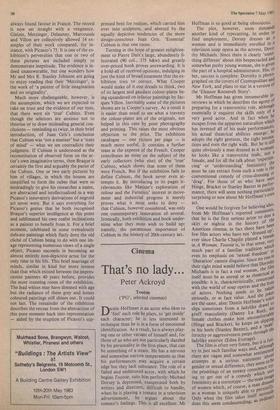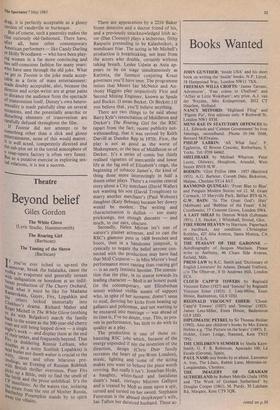Cinema
That's no lady...
Peter Ackroyd
Tootsie (PG', selected cinemas)
Dustin Hoffman is an actor who likes to `feel' each role he plays, to 'get inside' each character; he is less interested in technique than he is in a form of emotional identification. As a result, he is always play- ing one or other variant of himself and, for those of us who are not particularly dazzled by his personality in the first place, that can be something of a strain. He has a nervous and somewhat narrow temperament so that his performances may acquire a certain edge but they lack substance. The role of a failed and embittered actor, with which he begins Tootsie, suits him perfectly: Michael Dorsey is depressed, exasperated both by writers and directors, difficult to handle; when he is playing a tomato in a television advertisement, he argues about the tomato's feelings. This is all excellent: Mr
Hoffman is so good at being obnoxious.
The plot, however, soon demands another kind of typecasting. In order to find employment, Dorsey dresses as a woman and is immediately enrolled in a television soap opera as the actress, Doro- thy Michaels. Since there is clearly 'some- thing different' about this bespectacled and somewhat pushy young woman, she is given the part of a hospital administrator. His, or her, success is complete: Dorothy is photo- graphed on the covers of Cosmopolitan and New York, and plans to star in a version of the 'Eleanor Roosevelt Story'.
Mr Hoffman has given innumerable in'
terviews in which he describes the agony of preparing for a transvestitic role, although essentially it requires the skills only of a very good actor. And in fact when he escapes from the apparent naturalism which has invested all of his male performances, his actual theatrical abilities emerge: he adopts the right gestures, the right intona- tions and even the right walk. But he is still quite obviously a man dressed as a woman; he looks like a transvestite male, not a female, and for all the talk about 'experien- cing' or 'understanding' femininity the most he can extract from such a role is the conventional comedy of cross-dressing or `drag'. For those of us who have sea Hinge, Bracket or Stanley Baxter in perfor- mance, there will seem nothing particularly surprising or new about Mr Hoffman's own act.
One would be forgiven for believing also,
from Mr Hoffman's reported comments,: that he is the first serious actor to don. a skirt or nightie in the history of tniei American cinema; in fact there have bee, few film actors who have not 'dressed UP.; ever since Charlie Chaplin played a female in A Woman. Tootsie is, in that sense, very i
much part of a familiar tradition
even its emphasis on 'sexual freedom or `liberation' cannot disguise. Since no one In their right mind would believe that Dohe rothy Michaels is in fact a real woman, t filet Michaels must be as unreal or as theatrical :,
possible: it is, characteristically, concernve with the world of soap operas and the sn
takesof actors. Nothing needs to tak seriously, or at face value. And the .io7ce are the same, also: Dustin Hoffman's v. slips sometimes from a ladylike drawl his gruff masculinity (Danny La Rue)' female clothes make him uncomforta.un_ (Hinge and Bracket), he keeps on slipP e• in his heels (Stanley Baxter), and a rilbajthe
ferocity or aggressiveness peeps through ladylike exterior (Edna Everage). .
The film is often very funnY, but I, 't fan ny in just such familiar ways and, although there are vague and somewhat sentiment attempts at a serious statement tbo be gender or sexual difference, they seer% the proddings of an uneasy conscience uses ing to get out of a comedy vvili5hrnae femininity as a stereotype — the mateLssed of women which, of course, a man °Zia. as a woman is uniquely able to Persu._usb, Only when the film takes itself serdiOn_ry does this seem condescending; as or 1 a
drag, it is perfectly acceptable as a glossy version of vaudeville or burlesque.
But of course, such a paternity makes the film curiously old-fashioned. There have, after all, been other contemporary American performers — like Candy Darling or Holly Woodlawn — who have been play- ing women in a far more convincing and less self-conscious fashion for many years: Who have seen through the old joke. What We get in Tootsie is the joke made accep- table as a form of mass entertainment: inade doubly acceptable, also, because the director and script-writer are at great pains to distance the audience from the spectacle of transvestism itself. Dorsey's own hetero- sexuality is made painfully clear on several occasions, and the potentially anarchic or disturbing elements of transvestism are carefully defused throughout the film.
If Tootsie did not attempt to be something other than a slick and glossy entertainment, none of this would matter. It is well acted, competently directed and the sub-plot set in the torrid atmosphere of a soap-opera factory is often very funny. Hut as a putative exercise in exploring sex- ual relations, it is not a success.











































 Previous page
Previous page